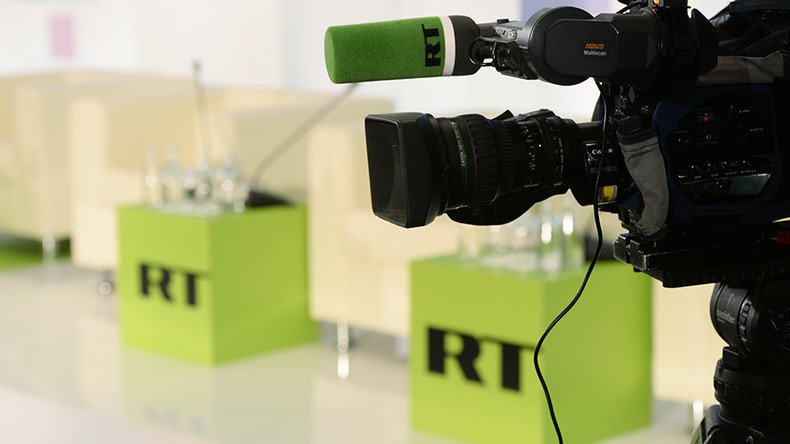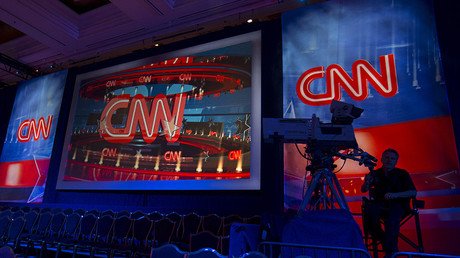‘Up to broadcast ban’: Russian officials discuss tit-for-tat steps over pressure on RT in US

Moscow may take tit-for-tat measures against US news outlets in response to Washington’s pressure against Russian media there, the Foreign Ministry’s spokesperson said as a Russian senators’ committee held a meeting to discuss the tense situation.
“Our [Russian] legislation envisages a possibility of imposing retaliatory restrictions against the… media of the states that have restrictive [regulations] specifically limiting the professional activities of Russian journalists,” Foreign Ministry spokesperson Maria Zakharova said.
She made the statement at the meeting of the Russian Federation Council’s Interim Committee on the Protection of Sovereignty. The body monitors foreign interference in the state’s internal affairs, with Thursday’s gathering focused on the problems Russian media is facing in the US. Zakharova went on to say that Russian laws allow officials and the Foreign Ministry in particular to take “tit-for-tat measures” that could involve a total “broadcast ban” for the US media, including private outlets.
The gathering also featured RT’s Editor-in-Chief Margarita Simonyan and the former Russian ambassador to the US, Sergey Kislyak, who gave their insights on the situation.
Simonyan particularly said that according to the channel’s lawyers, US branch staff could face arrests and property seizure if RT fails to register itself as a “foreign agent” as demanded by the US Department of Justice.
“We received a letter from the US Department of Justice, demanding that we register as a foreign agent. By October 17 we must ‘whip ourselves’ and say that we are a foreign agent,” Simonyan said, adding that “[our] lawyers tell us that if we [RT’s American branch] do not register as a foreign agent, arrests of our employees, seizure of property will follow – absolutely serious things.”
‘Unacceptable!’ RT pulled from YouTube prime ad list in US without notice https://t.co/ZhaefqycQ3pic.twitter.com/MF4NSe6oWf
— RT (@RT_com) 5 октября 2017 г.
Adopted in 1938 to counter pro-Nazi agitation on US soil, the Foreign Agents Registration Act, or FARA, exists so that “the people of the United States are informed of the source of information (propaganda) and the identity of persons attempting to influence US public opinion, policy, and laws.”
The active FARA register contains over 400 entities and includes tourist boards and lobbyists, but no media outlets, which have traditionally been exempt from the legislation.
Ambassador Kislyak, who headed the Russian diplomatic mission in the US for almost a decade since 2009, said the situation with RT is just a part of a big anti-Russian campaign launched by the US authorities.
“This is not just some selective discrimination, it is a part of a big offensive on Russia,” the diplomat, who was once accused of being a “shadowy spymaster” by those targeting the Trump administration, said.
In Kislyak’s view, the US embraced “containment” strategy amid Moscow’s “growing influence” in the world, which involves economic pressure and a “propaganda offensive.”
“Upon the recommendation of our committee, all relevant ministries and agencies were asked to develop and possibly to start implementing reciprocal measures against the US media in accordance with the existing Russian laws,” Andrey Klimov, the committee head, said.
He noted though that that all such measures should be strictly “adequate and well balanced.”
Any proposed package of measures could come into force as early as on October 17 and potentially affect any US media operating in Russia, Klimov stated.
The lawmakers also vowed to speed up their work on defining the notion of “interference into Russia’s domestic affairs” and formalizing it in legislation. They made clear that they could possibly launch parliamentary investigation into all incidents related to any such interference.
Over the past months, the US has not pulled any punches on Russia, alleging Moscow had its fingers in the 2016 elections and even helped Trump take the Oval Office. The Senate investigation into the matter has failed to provide the public with any solid evidence on Russia’s alleged meddling, despite the fact that it has already dragged on for months following the vote.
RT was propelled to center stage of the investigation following the publication of the declassified report by the Office of the Director of National Intelligence (ODNI) in January. Yet, no solid proof of RT’s alleged influence on the 2016 US election has been provided.
In a further step, Google expunged the news channel from its premium advertising service Google Preferred without any prior notice.
On Thursday, White House spokesperson Sarah Huckabee Sanders said that the Senate Committee – charged with examining alleged Russian involvement – has found “literally” zero evidence of connections between Trump’s election campaign and Moscow.
Earlier, RT’s Editor in Chief said that Washington “puts us in conditions in which we cannot work” and if it comes to the worst, the channel will be forced to stop broadcasting in America.
“In the worst-case scenario, Russia would respond in kind as to American media,” she said, adding that as a journalist she would not like such a situation to occur. “We have been taught that freedom of speech is sacred.”















